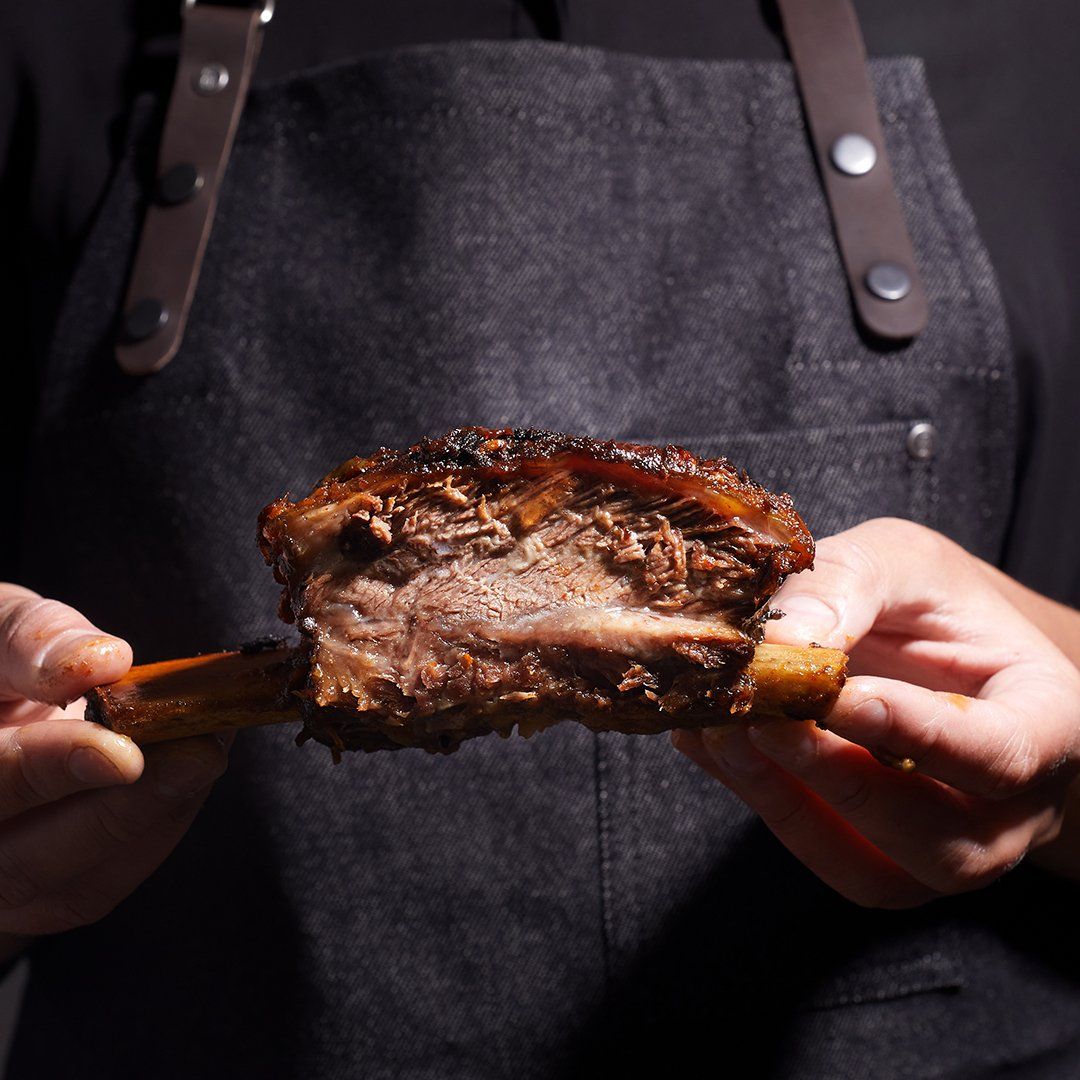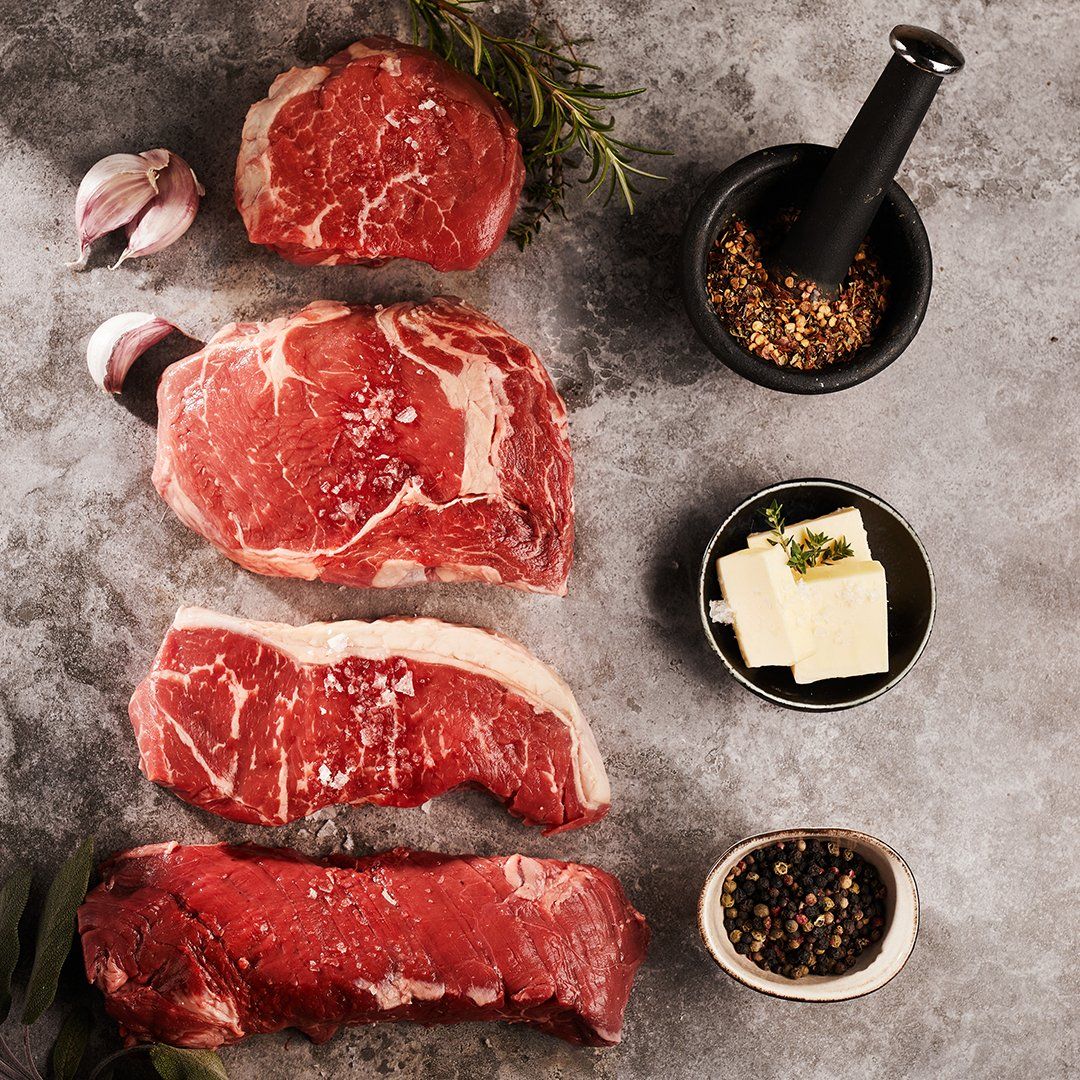Now shifting 40 to 50 Hereford hindquarters each week, we catch up with James Ludgate at his family’s meat wholesale business to find out how their premium beef offering has developed.

With a family history steeped in the poultry and feather supply business, Thame, Oxfordshire-based meat wholesaler TW Ludgate and son prides itself on provenance and quality in everything it does.
As such, and with a customer base of butchers, farm shops and other high-end outlets across the home counties, the company has developed a keen focus on premium brands, particularly in the beef it sells.
The most recent of these, is the firm’s three year old TWL Hereford Prime range of both hanging beef and boned-out cuts.
Since launching the brand in 2017 the Ludgate family has seen demand for its premium Hereford beef range rocket, with about 40 per cent of its beef customers choosing the TWL Hereford range over other beef, explains James Ludgate.
“The last few years have seen a dramatic shift in the beef trade, with both major retailers and high street butchers switching to lighter carcase weights which in turn lead to smaller cuts. This has been driven by a number of factors, but most notably a demand from consumers for smaller joints and a more consistent eating experience,” he explains.
Allied to this switch to smaller cuts and lighter carcases is a drive towards beef with higher levels of marbling, to provide high quality meat which delivers the eating experience consumers are looking for.
“We had established a premium range based on heavier continental cattle some 15 to 20 years ago, selling that as TWL Prime. But the market has since shifted and we saw an opportunity to capitalise on that and provide a product with greater provenance.
“As Hereford breeders ourselves we knew the quality of the product would be right, so we chose that as the basis for the premium range,” says James.
“We do pride ourselves on supplying a quality end product, so the number one criteria for the TWL Premium Hereford range is marbling, nothing comes above that for this range and it delivers every time for our customers.”
James explains that in establishing the new range, the family firm worked with meat processors Dunbia at Cardington and continues to do so today.
“They understood what we were trying to achieve and have enabled us to develop the range of both hanging beef and pre-packed primals and joints.”
Where hanging beef is required it is sourced as pistola hindquarters, a standard hindquarter with the ribs left on. To maintain consistency and quality, all beef for the range comes from carcases weighing between 300kg and 360kg, grading O+4L to R4L and sired by registered Hereford bulls.

“It doesn’t matter if the beef is dairy-bred or from suckler herds, so long as it is well-marbled, as we know it will deliver the taste and tenderness we require. Having started with 12 hindquarters a week, we now source about 40 to 50 hindquarters a week from Dunbia, which are then aged and boned out to make boxed beef.”
All beef for the range is matured for 12 days on the bone, with further maturation taking place in vacuum packs according to customer requirements.
“Every pack carries our Hereford premium labelling and is fully traceable back to the beast it came from,” he adds.
And while historically other breeds have been favoured for premium ranges, James says the Hereford range supplied under the TWL Hereford Premium label is well regarded by both butchers and their customers.
Working alongside his father, Michael, mother, Annette and brother, Sam, as well as a staff of about 20, James says 2020 has been a year of ups and downs in the meat wholesale business.
“Covid-19 has seen unprecedented demand from many of our customers as they have seen a surge in trade due to the first lockdown and customers looking for premium meat to eat at home instead of eating out.
“As we don’t deal with any catering trade we have been insulated from the ups and downs in that sector. Demand, particularly early in the first lockdown, was akin to Christmas week every week and it has been great to see the butchers and farm shops we supply reap the rewards for the service and quality produce they offer.”
Indeed, such has been the surge in sales through independent outlets in 2020 that James says the family have gained a number of new customers during the course of the year as other wholesalers haven’t been able to maintain either volume or quality of supply.
On the other end of the supply chain James says outside of its Hereford range which is sourced exclusively from Dunbia, Cardington, the firm deals with a range of beef suppliers across the UK, each best placed to supply specific cuts or primals and on a weekly basis moves about 15 tonnes of beef per week and just shy of 1,000 tonnes a year.
“Different suppliers and even different abattoirs within a group tend to have specialisms and we source beef from across the UK to suit the needs of our customers and the range they want to offer in their shops.”
Away from the meat business the family also farms 200 acres at Scotsgrove Farm in Thame in its own right. Here they keep a 40 cow herd of pedigree Herefords alongside recipients for embryo work and both pedigree and commercial sheep, with James taking a leading role in these enterprises. The herd is run alongside another passion of James’, pedigree Beltex sheep, of which the farm is home to 100 ewes.
“We’ve been breeding Herefords for about 15 years now and have sold to a high of 7,000gns for Rempstone 1 Even Money back in 2018 at the society’s main spring show and sale.”
Recent years have also seen the herd support the Designer Genes sale at Shrewsbury, offering top drawer consignments since the sale’s inception five years ago.
In the main though bulls tend to be sold from home, with about 12 sold each year to both dairy and suckler herds in the locality, with the trade predominantly to suckler herds as the number of dairy herds has declined in the area.
“The herd is split across spring and autumn calving to give a spread of ages in the bulls available for sale. Many might suggest that calving a herd our size in one season would be more efficient, but that would mean we may not have any bulls available at some points in the year and we could lose customers as a result,” he explains.
A respected judge and stockman in his own right, James had the honour of judging the National Show in Denmark, as well as other UK-based shows and was a member of the UK Hereford Youth team at the World Hereford Conference, New Zealand in March 2020.
“Being part of both these international events was a great honour and opened my eyes to the potential of Herefords and Hereford beef across the world. The New Zealand visit was a particular eye opener and one that enabled me to bring home many ideas for both the farm and butchery businesses,” adds James.
With an eye firmly on the future of both his own pedigree herd and the meat business James says the breed is well placed for the future so long as breeders pay close attention to the messages coming from the processing and retailing sector.
The beef industry is changing and while carcase size has reduced in recent years, James believes it is likely to reduce again in the coming years.
He says: “We must all be aware of what the market wants. Personal preferences and fashion are great, but they won’t always help produce the correct end product for the consumer. Lighter carcases with increased marbling will be the future of the sector for a good while to come.
“Eating quality must be maintained and even improved, with more consistency needed across the industry to ensure consumers keep coming back for more. Beef is regarded as a premium product so when you’re producing the top end it has to be faultless.”
James says breeders must continue to focus on easy fleshing cattle with the softness of flesh the breed is renowned for.
Looking to the future he has aspirations of installing a dry aging chiller at the family’s wholesale unit to add more value to the range on offer.
“The aim is to increase the product range on offer and add more premium products to help our customers and ourselves remain at the forefront of the sector.”
But he is cautions against thinking premium ranges can be conjured up for every sector.
“Without a doubt beef is the outright leader in premium ranges and other sectors struggle to replicate this success. Pork and chicken can do it to an extent, but it is coming from a low base, so the premium is always limited. Conversely, lamb is seen by many as an expensive protein already, so premium ranges tend to put it beyond the reach of many consumers,” he adds.

BOX - General facts:
- Launched the TWL Hereford range in 2017 and now represents 40 per cent of beef sales
- Number one criteria for Hereford beef range is marbling
- Runs 40 pedigree Hereford cows under the Rempstone prefix
- Supplies 1,000 tonnes of beef a year across all beef ranges
- Hereford Cattle enjoy summer grass and winter forage. They are easily managed, low maintenance and have no additives or growth hormones in their diet. That’s why our Hereford Beef is the best of British.
- Hereford Cattle are unmistakable with their characteristic rusty red and white markings. Their red colour can vary from a deep cherry to a lighter orange. Docile, friendly, and an excellent breed for grass-fed meat. They’re a joy for our producers to rear.
- Grass-fed Hereford Beef is so much better than your average steak. It’s packed full of Omega 3, contains more vitamins and minerals and has fewer unhealthy fats.
- Grass-fed, Hereford Beef is an excellent source of healthy fats and vitamins. It’s packed full of Omega 3, CLA, and antioxidants too. By buying grass-fed, you also contribute to a better environment. The UK’s meadows and pastures are one of our largest carbon sinks. What’s good for us should be good for the planet.
- The Hereford breed thrives on a grass-fed diet, which allows them to enhance and improve the environment by increasing organic matter, microbial activity and biodiversity while sequestering carbon in the soil - making Hereford Beef some of the most sustainable in the world. It’s Hereford Cattle’s appetite for grass which makes Hereford Beef tender and flavoursome while providing health benefits such as higher levels of omega-3.
- Hereford Cattle are one of the oldest and greatest breeds in Britain. Known for a variety of tender and succulent cuts, Hereford Beef lends itself to a myriad of dishes for every day of the week.
- One of the key visual cues that tells you your steak is good is the marbling. Something Hereford Beef is famous for. We believe marbled beef is superior because of its succulence, flavour and rich taste. The fat makes the meat softer and easier to chew, as there is simply less muscle fibre and collagen per unit volume of meat. This decreases the amount of chewing required, leading to a more rapid breakdown of the food, and greater flavour release.
- Hereford Beef is highly sought after by chefs and home cooks worldwide due to the high quality it offers. To maintain these standards of flavour and tenderness, our farmers rear their
Share:
You may also be interested in...














